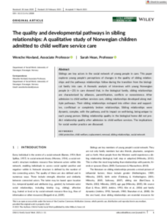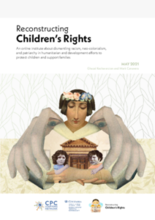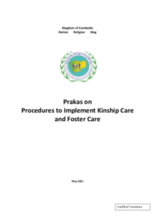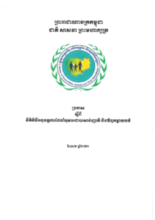Displaying 161 - 170 of 2221
This paper explores young people's perceptions of changes in the quality of sibling relationships and the pathways relationships follow during the transition from the biological family into care.
The purpose of this study was to present an illustrative test of whether an algorithmic decision aid could be used to identify youth at risk of exiting foster care without permanency.
The goal of the Reconstructing Children’s Rights Institute is to raise awareness and recognition of how racism, patriarchy, and power permeate the international child rights and child protection field. Building on Conversation #1, this session expands our political imagination by delving deeper into the international children’s rights and child protection space.
This study aimed to compare mental health problems and health service use among adolescents receiving in-home services (IHS), living in foster care (FC) and general population youth (GP).
This Prakas was drafted in accordance with Cambodia’s policies, standards and regulations to enable the implementation of kinship care and foster care. The Goal of the Prakas is to ensure the best interests of the child and protect the basic rights of the child separated from his/her biological parents and receiving kinship or foster care, so that they are safe and thriving in a warm, loving and happy family environment.
The Goal of the Prakas is to ensure the best interests of the child and protect the basic rights of the child separated from his/her biological parents and receiving kinship or foster care, so that they are safe and thriving in a warm, loving and happy family environment.
This study utilized secondary data from National Survey of Child and Adolescent Well-being (NSCAW II) to examine the experiences of 298 youth and their caregivers.
This article offers an account of the authors’ experiences as foster carers for an unaccompanied asylum seeker (and through him, supporting other asylum-seeking boys).
In the present study, the authors explored the adult-child interactions that took place in 116 families from Spain: 28 long-term non-kin foster families, 34 adoptive families, and a community comparison group made up of 54 families.
This study aimed to better understand the role that Court-Appointed Special Advocates (CASAs) play in the lives of transition-age youth (TAY) by asking participants about the nature of their relationships with their CASAs, and the extent to which their CASAs helped prepare them for independent living.





